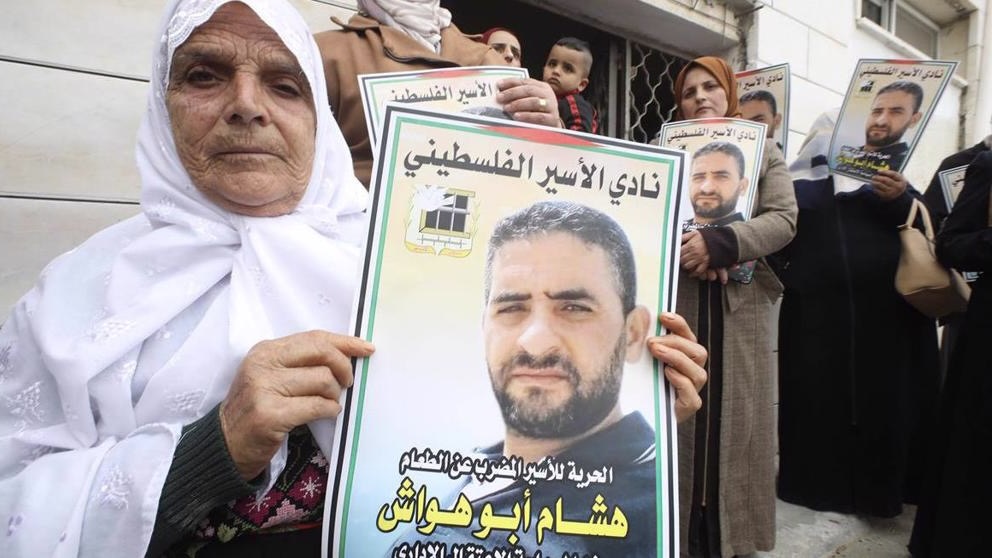Palestinian administrative detainee Hisham Abu Hawwash has decided to continue his hunger strike to demand the complete cancellation of the administrative detention order against him, according to his lawyer from the Palestinian Prisoners’ Society (PPS), Jawad Boulus. Abu Hawwash has been on hunger strike for 135 days against his illegal administrative detention.
On Sunday December 26, Hawwash was transferred to the Assaf Harofeh medical center from the Ramla prison in Israel where he was being detained in solitary confinement due to his rapidly declining health and physical condition. Hawwash has been on hunger strike since August 17 of this year, after his administrative detention was extended for a third time.
The detainee’s lawyer, commenting on the health status of his client, told local media that Hawwash is currently not able to stand or walk and is also facing extreme difficulty in speaking with him. He is also facing a range of other health complications such as serious weight loss, constant fatigue, pain, dizziness, migraine, chest palpitations in addition to the risk of life-threatening and irreversible heart damage as well as damage to his kidneys, liver, lungs, and nervous system.
With the severe deterioration in Hawwash’s health, prisoners’ rights groups and human rights activists have repeatedly urged the prison authorities to end the administrative detention against him and release him from prison on humanitarian grounds citing the very grave risk of death. However, their repeated appeals have been ignored. Both the prison authorities and courts on multiple occasions have refused to revoke the administrative detention order against him.
The PPS noted in a statement that the prison administration’s decision to freeze Hawwash’s administrative detention is not the same as voiding it. The freeze, they highlight, only means that the prison administration and the Shin Bet, Israel’s domestic security agency, are not responsible for the wellbeing and life of the detainee.
The move also changes Hawwash’s status from an official prisoner to an “unofficial detainee” in custody of the hospital and its security staff. Hawwash also cannot be transferred to any other hospital of his or his family’s choice for specialized treatment if needed but his family and lawyer can visit him as per normal hospital rules applicable for all patients. Additionally, this also gives the authorities the power to reinstate and even renew the administrative detention order against Hawwash at any given time without any charges or trial.
40-year-old Hisham Abu Hawwash is married and a father to five children. He is from the town of Dora, to the south of Hebron city in the occupied West Bank and was arrested on October 27, 2020 and detained under an administrative detention order. He was subsequently given three consecutive administrative detention orders of six months each, with the last one being reduced to 4 months.
Hawwash has also been arrested and detained several times in the past for participating in political and resistance activities against the Israeli occupation. He has spent a total of eight years in Israeli prisons since 2003, of which 52 months were under administrative detention orders.
There are currently close to 550 Palestinians being held in administrative detention in Israeli prisons, out of an estimated total of 4,650 Palestinians prisoners, including hundreds of children and women. Palestinians can be detained and held in Israeli prisons under the policy of administrative detention for indefinite periods of time without any charges filed against them as well no fixed date for a court trial where they can defend themselves. The orders for administrative detention are renewable every 4-6 months. The detainees are detained based on secret evidence which is not shared with them or their lawyers, making it extremely difficult for them to find a way to secure their release through legal means. This situation has driven many administrative detainees to launch hunger strikes and put their life on the line to demand their freedom.





